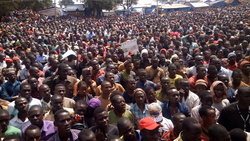Ugandan land defenders | 14 September 2021
Uganda government ignores its directive on COVID evictions, evicts thousands of smallholder farmers, artisanal miners
With the pandemic striking higher in Uganda, poor families continue to be forced off their land by their government and investors despite several directives halting evictions during the COVID period.
Uganda first went into lockdown on Monday the 30th of March, 2020, and the second lockdown was first announced on June, 06th 2021, and later revised by the government on June, 18th 2021 respectively to curb the spread of the novel coronavirus.
On April 16th, 2020, the government of Uganda through the ministry of lands ordered a total halt of all land evictions during the ongoing COVID-19 lockdown and directed all local governments and security agencies to enforce the order.
A second directive was announced on the 18th July 2021, with the current lands minister Judith Nabakooba stating that nobody should carry out evictions in this period.
Article 237 (1) of the 1995 Constitution of the Republic of Uganda states that land in Uganda belongs to the citizens of Uganda and shall vest in them in accordance with the land tenure systems provided for in this Constitution.
However, with the increased commoditization of land, such directives are hard to conform to.
Of the worst cases of forced evictions that have been documented in both lockdowns, the government of Uganda has had a lion’s share.
For instance, in May 2020, the government using armed forces forcefully evicted over 600 smallholder farmers in Hoima and Kikuube districts citing that they were occupying illegal fish land sites.
In another case that occurred on August 3rd, 2021 the government evicted over 200 people occupying the Maruzi ranch in the Apac district.
While in the same month of August, a government agency, the National forestry Authority torched several houses of poor families whom it regarded as encroachers in Moyo district, found in the northern region of Uganda.
In the latest looming evictions, the Uganda government is evicting more than 35,000 artisanal miners in the Kisita mines, located in Kisita village, Mbirizi sub-county in Kassanda district, 104 km from Uganda’s capital Kampala.
Both letters written by President Yoweri Museveni on the the12th day of October 2020 and 3rd May 2021, that were followed by his minister Peter.T. Lokeris, Minister of State for Mineral development dated the 24th of June 2021, directed the eviction of the artisanal miners before the 3rd day of November 2021 referring to them as illegal miners.
The community under the Kisita Mining Company were granted a mining lease ML 4603 for 21 years in 2002 over an area of 873 Ha in Kisita by the Ministry of Energy and Mineral Development under the Directorate of Geological Survey and Mines (DGSM) which casts doubt in government’s allegations that they are illegal miners.
Mr. Ssekate Abdullah is one of those whose livelihood has been thriving on artisanal mining. He joined Kisita in 2006 to try out his luck. Born in Malaba, a town in Tororo District, on Uganda's eastern border with Kenya, he says mining has been his job and has painfully gained from it.
Residents say they are bound to lose a livelihood in case the government goes on with its intended and illegal evictions.
Sharing a brief history of gold exploration in Kisita, Wegule Isaac says the activity began in the 1970s.
“In those years, very few people knew gold, the foreigners who knew it would purchase it from us but at low prices,” Mr. Wegule, one of the oldest people in the area said in an interview with this defender.
But in the early 2000s, mining activity boomed and many villagers switched from farming to gold mining in the hope that they would be able to increase their income. However, the new boom was short-lived as the government is now threatening the villagers with eviction.
According to Ssekate, more than 1,000,000 people have benefited or earned living ever since the exploration began.
Despite the pitfalls in the economy caused by the surging COVID-19 numbers, several Ugandans are being pushed into extreme poverty by their government.
Earlier in June 2021, while reading the National Budget, Mr. Amos Lugoloobi, who is now the minister of state planning said the mining in which the artisanal belong and extractives sector’s contribution to the country’s GDP increased from 1.1% in 2016/17 to 2.3% in 2020/21. He said the industry was allocated Shs. 49 billion (equivalent to USD 13.9 millions) in the budget for Financial Year 2021/22 to support the mineral development.
Many miners believe that the Kampala regime is subjecting them to absolute poverty since they are losing their land and source of income.
It should be noted that the same regime under the guise of not paying taxes, 3 years ago, deployed the army and forcefully evicted over 60,000 artisanal miners in Lugongwe gold mines in the same district.
The victims were never accorded an alternative resettlement














